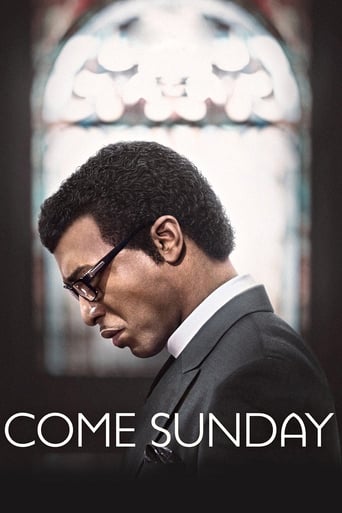Steinesongo
Too many fans seem to be blown away
Protraph
Lack of good storyline.
Grimossfer
Clever and entertaining enough to recommend even to members of the 1%
Kayden
This is a dark and sometimes deeply uncomfortable drama
sddavis63
I suspect that most people will evaluate this movie based on their personal belief systems. Fundamentalist Christians will hate it because it portrays a high profile Christian leader moving away from fundamentalism and into a universalist theological perspective. More progressive types will likely rate it higher for that same reason. The theology contained within it (such as Hollywood can really portray theology) is interesting. Certainly, the point gets made that the Bible can be used to defend either a fundamentalist (salvation through Jesus alone) perspective or a universalist (God saves everyone regardless of what they believe) perspective. I'll choose not to wade into the theological debate. Suffice to say that as a pastor I am neither fundamentalist nor universalist; I believe both perspectives (which make determinations about a person's eternal destiny) defy Jesus' instructions not to judge. I believe the gospel is intended to provide assurance in Christ without judgement on those outside Christ. I'll leave it at that.As for the movie itself, it's the story of the faith journey of Carlton Pearson (played by Chiwetel Ejiofor.) A protege of Oral Roberts (Martin Sheen), Pearson was ordained by the Church of God in Christ (a fundamentalist, pentecostal-type denomination) and eventually became pastor of a mega-church of more than 5000 members in Tulsa, Oklahoma. But over the course of his ministry there, his theology began to change and he started to struggle with the concept of hell and divine punishment, eventually becoming a believer in universalism (or, universal reconciliation.) That led to a major split in his church and ultimately his being declared a heretic by the Joint College of African American Pentecostal Bishops.I disagree with where Pearson's theology took him, but I can nevertheless admire his willingness to stand for what he believed in the face of the incredible pressure that was brought to bear on him to recant. It certainly showed how difficult both theologically and personally it would be for a pastor to radically change his or her views. It not only caused problems within the church and had repercussions for Pearson's career, it also ended relationships and turned friends into enemies. It's interesting to trace Pearson's theological journey, but there's no real "excitement" to the story. It's simply biographical. If I were to hazard a guess I would say that the perspective of those who made the movie (it's a Netflix production) is sympathetic to Pearson, although the portrayal of Oral Roberts was, I thought fair and balanced.This will probably be of most interest to those who have a theological interest in universalism. (6/10)
mark-537-646746
I wonder why anyone would think this would be an interesting story. If God would have told him to build a building we would call him a nut job, but if God calls him to a message of "inclusion" he is a hero? Those inside the church will see this as another
Story where a guy lost his faith as hollywood likes to tell. Those outside the church will see this as some fight over boring church theology. Maybe a Unitarian would like it.
jamesignatius
This is a biopic film that tells the story of a Pentecostal preacher who came to the conclusion that all humans and their sins are atoned for by the Cross of Christ, regardless of whether one has a relationship with Christ or not.The film displays good acting and production value, but the script only skims the surface of the internal and intellectual shift Pearson embraced that took him into heresy and heterodoxy. As a Pentecostal and Evangelical, he believed in Calvin's doctrines of Total Depravity and Penal Substitution Atonement. Pearson finally admitted these doctrines make God look like a monster and threw them out. He reached for an extravagant love beyond what humans are capable of and concluded that God loves the world so much that he would not send people to hell, having previously concluded that God does send people to hell - as Pearson is depicted in this film, if not in reality. However, he consulted on the film.Pearson and his detractors also assume to have the authority to interpret Scripture and are obsessed with "knowing" whether every person goes to heaven or hell after death. These assumptions go unchallenged in the script, but along with Calvanist doctrines are the underlying causes of the whole story.The film is thought-provoking and worth watching. It displays the biggest problems with Protestant fundamentalism from the inside, but could have done so much better.
adonis98-743-186503
Evangelist Carlton Pearson is ostracized by his church for preaching that there is no Hell. Despite good efforts from it's talented lead and cast in general Come Sunday (2018) goes into the same old dramatic territory that most of those films have in common and the end result was very disappointing with wooden characters and even more wooden perfomances. Overall a big disappointment of a dramatic driven movie that even despite the good cast it can't overcome it's bad script and direction i'm afraid. (0/10)

